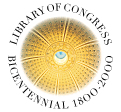


Public
Affairs Office
101 Independence Ave. SE
Washington DC 20540-1610
tel (202) 707-2905
fax (202) 707-9199
email pao@loc.gov
August 23, 2000
Press Contact: Helen Dalrymple (202) 707-1940
Public Contact: Robert Saladini (202) 707-2692
Mario Castelnuovo-Tedesco Collection Given to Library of Congress
The large archives of 20th century composer Mario Castelnuovo-Tedesco (1895-1968) have been given to the Library of Congress by the composer's son, Lorenzo Castelnuovo-Tedesco, and Lisbeth Castelnuovo-Tedesco, widow of the composer's son, Pietro. Together with an extensive collection of music manuscripts that the composer and his family gave to the Library in the past, and a number of manuscripts by Castelnuovo-Tedesco in the Library's Moldenhauer Archives, this collection is now the preeminent archives for the study of this important composer.
The collection contains manuscript and printed music, programs, reviews of Castelnuovo- Tedesco's music, contracts, photographs and related materials. In addition, the collection includes correspondence from many of the 20th century's major musical figures, such as Samuel Barber, John Barbirolli, Bernard Berenson, Ernest Block, Katherine Dunham, Eileen Farrell, Jascha Heifetz, Erich Leinsdorf, Lotte Lehmann, Gian Carlo Menotti, Dimitri Mitropoloulos, Hans Moldenhauer, Pierre Monteux, Charles Munch, André Previn, Harold Schonberg, Andrés Segovia, Nicolas Slonimsky, Leopold Stokowski, Arturo Toscanini and many others. A large body of family correspondence also accompanies the collection.
Castelnuovo-Tedesco was a prolific composer, although much of his music remained unpublished during his lifetime. He wrote for nearly every performing medium, including opera, ballet and film; he also composed orchestral, choral, chamber, vocal and piano works. A long association with guitarist Andrés Segovia inspired Castelnuovo-Tedesco to write a significant number of works for guitar.
Mario Castelnuovo-Tedesco, born into a Florentine Jewish family in 1895, attended the Cherubini Conservatory in Florence, where he studied piano with Edgardo del Valle and composition with Ildebrando Pizzetti. Fame and success came early to Castelnuovo-Tedesco, thanks to his skill as performer and composer as well as the support of Alfredo Casella and the Società Nazionale di Musica Moderna. Many of his early compositions figured prominently in the programs of Italian and other European orchestras and performing ensembles between the two world wars. Arturo Toscanini and the New York Philharmonic Orchestra premiered several of Castelnuovo-Tedesco's works, including I profeti (Violin Concerto no. 2) in 1933 with Jascha Heifetz as soloist, and, in 1935, Cello Concerto with Gregor Piatigorsky as the soloist. In 1939, the composer was the soloist in the premier of his Second Piano Concerto with the New York Philharmonic, this time under the baton of John Barbirolli.
In 1939, because of the unstable political situation in Italy, Castelnuovo-Tedesco and his family emigrated to the United States with the assistance of both Heifetz and Toscanini. He eventually settled in Beverly Hills, where he died in 1968.
Included among Castelnuovo-Tedesco's post-immigration compositions are the Concerto for Two Guitars (1962); a large number of works inspired by Shakespeare, including Overture to A Midsummer Night's Dream (1940), and some vocal pieces. He also wrote an opera, The Merchant of Venice, which won first prize in an international competition sponsored by La Scala in 1958, and a number of guitar solos, written mostly at the request of Andrés Segovia. Like so many other European immigrants of his era, Castelnuovo-Tedesco composed music for films ("Gaslight" and "Ten Little Indians") and was well regarded as a teacher by other film music composers such as André Previn and John Williams.
# # #
PR 00-114
8/23/00
ISSN 0731-3527